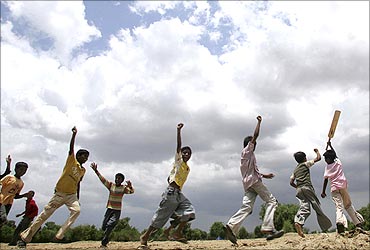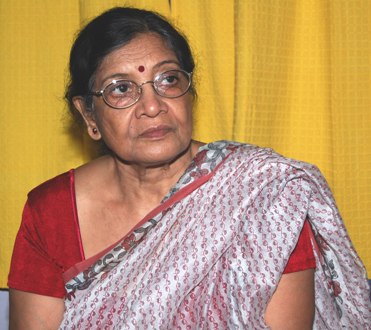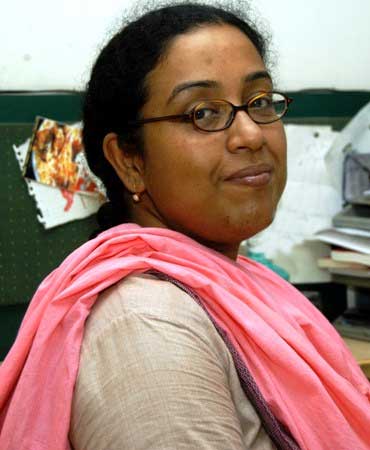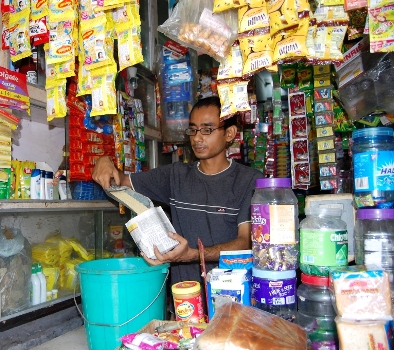
The Indian economy is galloping at a breakneck speed and might even reach double-digit growth by 2013, feel Finance Minister Pranab Mukherjee and Commerce Minister Anand Sharma. Many economists agree that the demographic dividend that India enjoys could see the country sustain its high growth rate for a long time to come.
The India growth story is indeed enviable. Despite being plagued by myriad problems, India has emerged stronger and more resilient to any global crises so far.
India is expected to be the world's fastest growing economy by 2018, according to Economist Intelligence Unit, a research arm of the Economist magazine.
But does this so-called growth reach Indians living at the lowest rung of the society, does 8-8.5 per cent rise in gross domestic product indicate better living conditions for the poorest of the poor?
What does aam aadmi feel about this development story so well publicised by the politicians, economists and media alike?
Rediff.com spoke to a cross section of people to know their opinion about the possibility of India emerging as the next economic superpower. . . .

Dr Amitrajit Saha
Public health specialist (he has worked with marginalised populations)
On growth, in the true sense of the term
First we need to ask ourselves what do we mean by growth?
Some 'growth' is considered 'good', like growth in gross domestic product, growth in industrial production (notwithstanding the havoc it plays on the environment); but some 'growth' like the 'population growth' is considered 'bad' growth.
So we need to define two things: which growth are we talking about, and who is doing the talking?
What are the parameters of growth?
India has had 'great' industrial growth and 'economic' growth by the economic parameters of gross domestic product, gross national product, et al; but has 'not grown' at all in other sectors like health, education, quality of lives, nutrition, newborn, childhood and infant mortality, infectious disease prevention, etc.
We still have extremely poor health indicators: more than 46 per cent of our children are malnourished -- so, where then is this 'growth'?
I think the viewpoint that 'growth' should only focus on economic growth is deeply problematic. I believe that distribution of that growth, equity and rights equally need to be measured to say that we are 'growing'.
On India growing at the rate of 8-8.5%
I think in terms of economic growth: this is indeed fabulous!
But if we say that to the Uttar Pradesh rural woman whose baby dies because she couldn't reach the Lucknow private hospital. The place she did reach -- a government primary health centre -- did not have the medical officer (who may/may not have been busy getting a piece of that 'growth' at that time).
So how does this 'fabulous' growth affect this UP woman?
Or take the case of a tribal woman in India's heartland -- whose life is going to be changed totally -- because 8 per cent GDP translates to her being evicted out of her ancestral home and her land dug up for bauxite or chromium or hematite ore or coal.
Therefore, growth is only fabulous when its fruits are equitably distributed and all the people get a share.
Has the government been able to cater to the basic needs of our people?
Again, we need to define what we mean by 'basic needs'. If by that we mean livelihood, food, clothing, shelter, education, health (mental and physical), pleasure, dignity, choice, for all people -- we can comfortably say that till now, we have not been able to fulfil these for all the people.
Are the rich in our country getting richer and the poor poorer?
I wouldn't really know that never having been 'rich' myself, but most published indicators seem to point at that. We must take into account the increasing numbers of our dollar billionaires in India.
The names of the top industrial house owners are now part of the global rich list and going by the public display of their spending, it does seem that they are getting richer.
What needs to be done
To be honest, I am not too sure. The old pattern of socialism did not last. Perhaps, we need a new discourse entailing new kinds of social movements.
Sheer militarising populations won't be of much help.When the State usurps power, denies people their rights and redressal formula is thrown out of the window, people suffer and growth takes a backseat.
. . .
Shyamal Das
Autorickshaw owner-cum-driver
I am not the right person to be talking about India's growth and economic expansion. I am not equipped for that.
I have been to school for a few years only and had to quit as my parents could not afford my studies.
Growth, therefore, to me suggests a better life for my kids. I thought I was giving them one till recently. In the last couple of years, prices of essential commodities have gone up alarmingly high throwing our monthly household budget out of gear.
My elder daughter had to quit school as I could not pay her fees. She is now working part time at a zari factory in the vicinity.
My younger daughter is still studying though I am not sure how long I will be able to send her to school.
My wife, who was a homemaker till now, is thinking of taking up jobs as a household maid as it has become virtually impossible for us to make both ends meet with Rs 6,000 that I make every month.
We became poorer over the last few years. And we are the citizens of India. If India is growing, isn't it expected that we grow with it as well? Or are we to suppose that by growth it means the rich should get richer and the poor poorer?
Therefore, to me, India's growth story seems to be only 'full of sound and fury signifying nothing'.
. . .

Krishna Bandyopadhyay
Social activist, writer
Mahatma Gandhi had once said, 'Whenever you are going to take a step for development in India, think carefully whether it is going to benefit the poorest, the most vulnerable section of the country or not.' These might not be his exact words, but that is what he had said in spirit.
Have we done that with our growth and development policies? The answer is a big 'No'.
What have we achieved in the last 63 years? We have built a big Army -- a huge arsenal at enormous costs -- we are even exporting/supplying arms to other countries.
Why? Do we want to build a powerful nation? But isn't a nation strong only when each of its citizens is sound in health, education and value-based well-being?
A small percentage of our expenditure on defence would have sufficed to provide basic healthcare to all of our people. But look at our healthcare system. The government is fast withdrawing from its responsibility to provide even primary healthcare to its people free of cost or at a minimum expense.
Healthcare now has become more and more privatised -- a commodity affordable only for the rich or the upper middle class. The poor are not even entitled to have good health.
As for education, the least said the better. A lot of big talk is doing the rounds about free and compulsory education for all. But nearly 50 per cent of India's children are still not going to school.
We must remember that every child who is not in school is doing labour somewhere -- at home or outside. Is there a political zeal to deal with child labour, a shame for a country that boasts of 8.5 per cent growth?
Let's face it: we have absolutely failed our children we have not been able to give them even a fraction of their rights.
Our nation is riddled with reprehensible practices like child marriage, dowry, caste discriminations . . . Honour killing is still the order of the day. We have done practically nothing to enlighten our masses to stop such horrific malpractices.
Today, out of the 100 richest people in the world, quite a few are from India. On the other side of the scale, 65 per cent of our children are malnourished.
Every day, we hear about people dying of starvation, families committing suicide because of debt.
I wonder, why do our economic policies make the rich not only richer but richest, competing with the most affluent in the developed countries, while pushing the poor to the very brink of existence.
The growth of India must mean the growth of every individual Indian in a thoroughly inclusive manner. India is a rich country, comprising a rich minority and a poor majority.
A fair system of distribution of its resources would provide a good life for one and all. After all, there is always enough for everyone's need but not for some people's greed.
The recent unrest and violence in the tribal corridor is a grim warning that all is not well in India. We urgently need to change our economic, industrial, health, education policies if we are to avoid a civil war -- a war which we will bring upon ourselves through our heartlessness.
It is time our lawmakers gave up their foolish shortsightedness and obsessive perception of 'growth'.
. . .

Yajnaseni Chakraborty
Journalist
Last year, I interviewed Nandan Nilekani before the launch of his book Imagining India: Ideas for the New Century, here in Kolkata. Months earlier, I had interviewed Shobhaa De before the launch of her book, Superstar India: From Incredible to Unstoppable.
Both Nilekani and De are forceful, eloquent speakers, and in their own, very different, ways, both were trying to make the point that India was on the verge of greatness, if only we didn't lose the plot midway.
Global recession had set in by then, yet we in India didn't seem to be doing too badly. That, said a friend who worked in the financial sector, was because India was a traditionally high-inflation economy and would absorb the effects of the recession without too much trouble.
A little over a year down the line, I think we are beginning to lose the plot, before we've even begun.
Two years of poor rainfall, skyrocketting food prices, inept governance, several manmade disasters, constantly spiralling inflation, and rising unemployment later, I find it difficult to be optimistic about India's seemingly shining future.
And the most tragic aspect of the situation, I think, is that our troubles continue to spring from the two ills that have forever plagued us: corruption and over-population. That, at any rate, hasn't changed.
However, most of us are so busy trying to make ends meet that we have little energy left to consider reforming the society we live in.
The average Indian is just not bothered about the big picture. S/he is more worried about how much the cooking gas will cost from next month, or how much the family will have to sacrifice if they are to continue to eat vegetables at every meal.
Our multinationals and the celebrated IT sector are still booming, but what of the India beyond?
The government can apparently do little to check either corruption or population, which means we are stuck with our problems. So no matter how much you rub, India will find it difficult to shine in the near future.
. . .

Subodh Kumar Saha
Retired central government employee
I served the central government as a public works department officer for years. I raised my family with the salary I got. And things never seemed uncomfortable. Until recently.
I retired a few years back and thought the pension that I would draw would keep me afloat. It did, but only for a while. Now inflation has eaten into my savings, pension, household budget, everything.
And people talk of India growing. I find the thought ludicrous. How is it growing when its people are reeling under heavy burden of an acute price rise?
Does growth only mean statistical growth only? Growth should reflect on the general population's standard of living, isn't it? If India is growing, why are retired people like me being forced to cut down on their daily expenses? The growth should be an all-inclusive one, isn't it?
As a government employee, I had the chance to travel widely across India and, everywhere I went, I came across the same story -- that of rich getting richer and poor poorer.
It's surprising that our leaders keep changing but the condition of the general population continues to languish in the same old state of misery and suffering.
In our youth, we dreamt of a bigger India, a better country. But our dreams lay shattered. I am sad.
. . .

Subimal Ghosh
Grocery shopowner
Is India growing? Then I must be living in another country. I have not noticed any growth in me in the last 15 years.
What do I mean by growth, you may ask. By growth, I mean better education, an improved healthcare facilities and a better standard of living.
As a boy of 10, I cherished a dream -- that of becoming a doctor. My friends told me if I do well in my studies, I may get some government assistance.
I studied well, put in a lot of hard work and scored well in the Class X examination. But then my father fell ill and lost his job.
Immediately, things around me stood on their head. I had to take care of my family of four. I took loan from a friend and set up a grocery shop close to my place. My dream of becoming a doctor lay buried for good.
I have some friends who are doing well in their careers. I hear a lot about the western countries from them. There, I hear, the government takes care of the people in need. To me growth stands for a sympathetic government.
It indicates a set of rulers that feels for its people.
Can you find me a single politician today who actually feels for us, the poor? Those who are sympathetic are strategically booted out of their parties or are successfully sidelined.
It's a sad state of affairs.
At times, I feel so frustrated, I want to scream at the top of my voice and let it all out in one go. But then what's the use? We have a Parliament that is deaf and dumb.
. . .

Debasish Dutta
Teacher
I am a teacher and am supposed to be a guide for those I tutor. But at times, I feel so confused that I don't know what to tell them.
A lot of talk goes on about India shining. I get even more perplexed by such statements. What do the politicians and analysts mean by 'shine'? I don't know.
They can't be equating shine to growth, for sure. It's true that India made considerable progress in the field of information technology over the last 10 years. But how many Indians have been directly benefited by that? Not many, I am certain.
Had the benefits percolated into the lowest stratum of the society, youth of India would have worn a different face altogether.
Look at the state of education in this country. I am aghast to read that there are more than 60 million child labourers in India! It should make our heads hang in shame!
It pains me a lot when I see children from poor families working on daily wages at the roadside dhaba and the tea stall.
They are not supposed to toil -- they are meant to be in schools. The government needs to step in here and take some concerete steps.
There is no point in building a huge Army when almost half of the country's population starves.
If by growth, Indian politicians mean some inane statistics, nothing can be more tragic. India will grow only when Indians, even the poorest of them, get the best of healthcare, can send their children to schools, can feed their families and can lead a comfortable life.
I don't believe in growth that only stands for the wealthy getting wealthier. I believe in a growth that takes the poor within its purview with as much fervour.
. . .

Indradeep Bose
Student
Is India going to be a superpower? I am neither an economist, nor an astrologer. Can't make such tall claims or predictions.
After many years, we have got Pranab Mukherjee as the finance minister. I was pretty optimistic that he wouldn't let us down. But till date, he has not offered anything attractive for us -- the middle class or the lower middle class.
I read somewhere that Congress president Sonia Gandhi dreams of having a uniform educational system across India. I sincerely believe such a policy will be a blessing for us all.
Having said that, I also appeal to the government to augment the avenues for education at a uniform rate across all the states of India. Why is it always that cities like Mumbai and Delhi have the best facilities, whereas cities like Kolkata and Chennai lag far behind?
After all the central government is for all the people of India, right? Then, why does it mete out such step-fatherly attitude to some states and cities?
More schools and colleges need to be set up, especially in those states where the educational infrastructure is poor. After all, the youth is the backbone of India and the onus rests on our leaders to make it stronger.
As for me, I would soon be scouting the colleges of West Bengal to get admitted to graduation courses. And I am sure it is going to be a backbreaking exercise. Now, higher studies look easy only for those students who score above 90 per cent.
Has the government ever thought what happens to those who get less than that? Doesn't our constitutional Preamble suggest that basic education should be provided equally to one and all? Why don't our leaders put that to practice then?
Growth of a country should not be measured by the number of billionaires it houses. Growth should reflect a visible change in the life of the poor and lower middle class.
India boasts of a glorious past and it has the potential to have a great future.